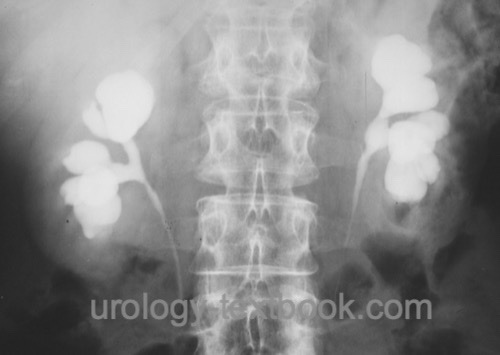You are here: Urology Textbook > Kidneys > Megacalycosis
Megacalycosis
Fundamentals and Symptoms of Megacalycosis
Definition:
Megacalycosis is the enlargement of the calyceal system without urinary tract obstruction or vesicoureteral reflux caused by a malformation of the renal papillae.
Epidemiology:
Male:female = 6:1
Pathophysiology of Megacalycosis:
The malformation of the renal medulla leads to short collecting ducts and an increased number of calyces. Megacalycosis causes a mild disturbance of the maximum concentration capacity of the kidney, the long term prognosis in relation to renal function is good.
Signs and Symptoms:
In general, no complaints.
Diagnostic Workup of Megacalycosis
Intravenous Urography:
Intravenous urography shows an enlargement of the pyelocalyceal system and increased calyces. There is no ectasia of the renal pelvis and ureter [fig. Megacalycosis in intravenous urography].
VCUG:
No vesicoureteral reflux in voiding cystourethrography.
Renal Scintigraphy:
Renal scintigraphy reveals sormal renal function with rapid washout of the radionuclide.
 |
Treatment of Megacalycosis
Specific treatment is unnecessary.
| Calyceal Diverticulum | Index | Extrarenal calyces |
Index: 1–9 A B C D E F G H I J K L M N O P Q R S T U V W X Y Z
 Deutsche Version: Megakalikose
Deutsche Version: Megakalikose
Urology-Textbook.com – Choose the Ad-Free, Professional Resource
This website is designed for physicians and medical professionals. It presents diseases of the genital organs through detailed text and images. Some content may not be suitable for children or sensitive readers. Many illustrations are available exclusively to Steady members. Are you a physician and interested in supporting this project? Join Steady to unlock full access to all images and enjoy an ad-free experience. Try it free for 7 days—no obligation.
New release: The first edition of the Urology Textbook as an e-book—ideal for offline reading and quick reference. With over 1300 pages and hundreds of illustrations, it’s the perfect companion for residents and medical students. After your 7-day trial has ended, you will receive a download link for your exclusive e-book.